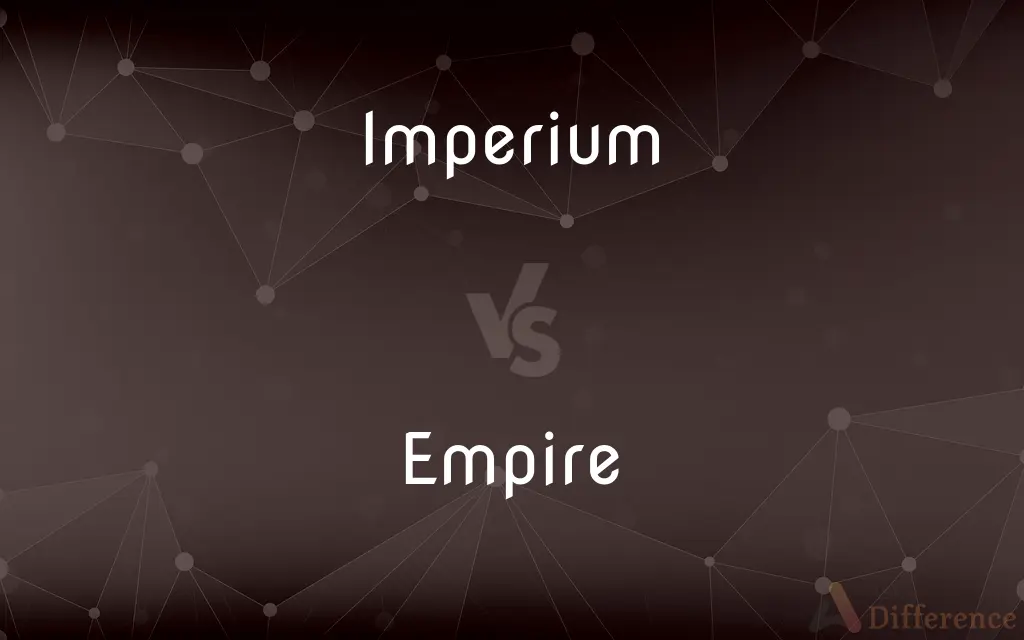Imperium vs. Empire — What's the Difference?
By Urooj Arif & Maham Liaqat — Updated on April 4, 2024
Imperium signifies authority or command, often with a legal or formal tone, while Empire refers to a large sovereign state under a single ruler, emphasizing territorial and political dominance.

Difference Between Imperium and Empire
Table of Contents
ADVERTISEMENT
Key Differences
Imperium is a term that originates from ancient Rome, denoting the authority granted to individuals to command and administer justice, reflecting a legal or governmental power. On the other hand, an Empire typically refers to a vast sovereign state or territory under the rule of an emperor or monarch, highlighting aspects of control, expansion, and governance over diverse regions and peoples.
Imperium, in its classical sense, underscores the legal and strategic power bestowed upon Roman magistrates and military commanders, emphasizing roles and responsibilities within a structured political framework. Whereas an Empire extends beyond mere governance, embodying the physical expanse, cultural influence, and military might exerted over conquered lands and peoples, often through historical processes of annexation and colonization.
While imperium is closely associated with the concept of authority and the right to exercise it within a specific jurisdiction or domain, it is more abstract and can be applied to various levels of power and governance. An Empire, however, is tangible and quantifiable, defined by its territorial boundaries, population, and the centralization of power in a ruling figure or dynasty.
The use of imperium can also imply a moral or ethical right to lead or command, suggesting a form of legitimate power that is recognized and respected within a particular context. An Empire, in contrast, often acquires its status and territory through force or negotiation, with legitimacy coming from power, tradition, or historical succession.
Imperium and Empire, while sharing elements of power and dominance, diverge in their essence and application. Imperium is rooted in the authority to govern, often backed by law or constitution, while an Empire embodies the physical and political manifestation of extensive sovereign rule over territories and peoples.
ADVERTISEMENT
Comparison Chart
Definition
Authority or command, especially with a legal or formal aspect.
A sovereign state ruled by an emperor or monarch, emphasizing control over territories.
Origin
Latin, specifically Roman context.
Old French "empire," from Latin "imperium," meaning command or authority.
Connotation
Legal authority, governance.
Political and territorial dominance.
Application
Legal and governmental power.
Sovereign state, territorial control.
Key Characteristics
Emphasizes the right to govern and administer justice.
Defined by its geographical expanse, cultural influence, and centralized power.
Compare with Definitions
Imperium
Legal or governmental authority.
The senator was granted imperium over the province.
Empire
Territory under a single ruler.
His ambition was to build an empire that lasted centuries.
Imperium
Command or control within a specific sphere.
His imperium over the military was absolute.
Empire
A large sovereign state.
The Roman Empire was known for its extensive territory.
Imperium
A right to enforce law and order.
The magistrate exercised his imperium to maintain peace.
Empire
Political and military dominance.
The empire expanded its borders through relentless conquests.
Imperium
Power to command obedience.
The general's imperium was recognized across the empire.
Empire
Centralized authority.
The empire was governed from the capital by the emperor.
Imperium
Symbolic or moral authority.
The leader's imperium stemmed from her wisdom and fairness.
Empire
Cultural and economic influence.
The empire's culture influenced every corner of its territory.
Imperium
In ancient Rome, imperium was a form of authority held by a citizen to control a military or governmental entity. It is distinct from auctoritas and potestas, different and generally inferior types of power in the Roman Republic and Empire.
Empire
An empire is a sovereign state made up of several territories and peoples subject to a single ruling authority, often an emperor. A state can become an empire either by a narrow definition through having an emperor and being named as such, or by a broad definition as stated above as an aggregate territory under the rule of supreme authorities such as the Roman Empire.
Imperium
Absolute rule; supreme power.
Empire
An extensive group of states or countries ruled over by a single monarch, an oligarchy, or a sovereign state
The Roman Empire
Imperium
A sphere of power or dominion; an empire.
Empire
A large commercial organization owned or controlled by one person or group
Her business empire grew
Imperium
Supreme power; dominion.
Empire
Denoting a style of furniture, decoration, or dress fashionable chiefly during the First Empire in France. The decorative style was neoclassical but marked by an interest in Egyptian and other ancient motifs.
Imperium
The right to command the force of the state; sovereignty.
Empire
Denoting produce from the Commonwealth.
Imperium
Supreme power; absolute dominion; empire.
Empire
Of, relating to, or characteristic of a neoclassic style, as in clothing or the decorative arts, prevalent in France during the early 1800s.
Imperium
The right to command, which includes the right to employ the force of the state to enforce the laws. It is one of the principal attributes of the executive power.
Empire
A variety of apple having dark red skin and white flesh.
Empire
A political unit having an extensive territory or comprising a number of territories or nations and ruled by a single supreme authority.
Empire
The territory included in such a unit.
Empire
An extensive enterprise under a unified authority:a publishing empire.
Empire
Imperial or imperialistic sovereignty, domination, or control:the extension of empire to distant lands.
Empire
A political unit, typically having an extensive territory or comprising a number of territories or nations (especially one comprising one or more kingdoms) and ruled by a single supreme authority.
The Russian empire
Empire
A political unit ruled by an emperor or empress.
The Empire of Vietnam was a short-lived client state of Japan governing Vietnam between March 11 and August 23, 1945.
Empire
The group of states or other territories that owe allegiance to an imperial power (foreign to them), when distinguished from the native territory of that power; imperial possessions.
Empire
An expansive and powerful enterprise under the control of one person or group.
The McDonald's fast food empire
Empire
(Absolute) control, dominion, sway.
Empire
Alternative case form of Empire.
Empire
Supreme power; sovereignty; sway; dominion.
Over hell extendHis empire, and with iron scepter rule.
Empire
The dominion of an emperor; the territory or countries under the jurisdiction and dominion of an emperor (rarely of a king), usually of greater extent than a kingdom, always comprising a variety in the nationality of, or the forms of administration in, constituent and subordinate portions; as, the Austrian empire.
Empire carries with it the idea of a vast and complicated government.
Empire
Any dominion; supreme control; governing influence; rule; sway; as, the empire of mind or of reason.
Another force which, in the Middle Ages, shared with chivalry the empire over the minds of men.
Empire
The domain ruled by an emperor or empress
Empire
A group of countries under a single authority;
The British empire
Empire
A monarchy with an emperor as head of state
Empire
A group of diverse companies under common ownership and run as a single organization
Empire
An eating apple that somewhat resembles a McIntosh; used as both an eating and a cooking apple
Common Curiosities
Does imperium imply military power?
While imperium includes the power to command military forces, it primarily refers to legal and governmental authority.
How does imperium differ from empire in terms of authority?
Imperium emphasizes legal or formal authority within governance, whereas an empire embodies territorial and political dominance.
Is an empire always ruled by an emperor?
Traditionally, yes, but the term can also refer to a large sovereign state under a single ruler or governing body.
What is imperium?
Imperium refers to the legal or governmental authority and command, especially within a specific sphere or domain.
Can imperium exist without an empire?
Yes, imperium can exist as a concept of authority and command within any governance structure, not necessarily within an empire.
How is the territory of an empire determined?
The territory of an empire is determined by its borders, which are often expanded through conquest, colonization, or negotiation.
Can an empire exist without physical territories?
Historically, empires are defined by their control over territories; however, the concept can be metaphorically applied to non-territorial domains.
What role does legitimacy play in imperium and empire?
Legitimacy is fundamental to both, ensuring recognition and respect for authority in imperium, and justifying rule in an empire.
What defines an empire?
An empire is a large sovereign state or territory under the rule of an emperor or monarch, characterized by its control over diverse regions and peoples.
How has the concept of imperium evolved over time?
Imperium has evolved from a specific Roman legal concept to a broader notion of authority and command in various governance contexts.
What is the significance of imperium in Roman history?
In Roman history, imperium was a crucial concept denoting the authority granted to magistrates and military commanders.
How do cultures within an empire typically interact?
Cultures within an empire interact through processes of assimilation, resistance, and cultural exchange, influenced by the central power.
Can the concept of imperium apply to non-political fields?
Yes, imperium can metaphorically apply to areas where authority or command is recognized, outside of strictly political contexts.
How does an empire maintain control over its territories?
Through a combination of military might, administrative governance, cultural assimilation, and economic dominance.
What challenges do empires face?
Empires face challenges such as managing diverse populations, dealing with rebellion, maintaining borders, and sustaining economic stability.
Share Your Discovery

Previous Comparison
Juice vs. Puree
Next Comparison
Guillotine vs. MaidenAuthor Spotlight
Written by
Urooj ArifUrooj is a skilled content writer at Ask Difference, known for her exceptional ability to simplify complex topics into engaging and informative content. With a passion for research and a flair for clear, concise writing, she consistently delivers articles that resonate with our diverse audience.
Co-written by
Maham Liaqat














































